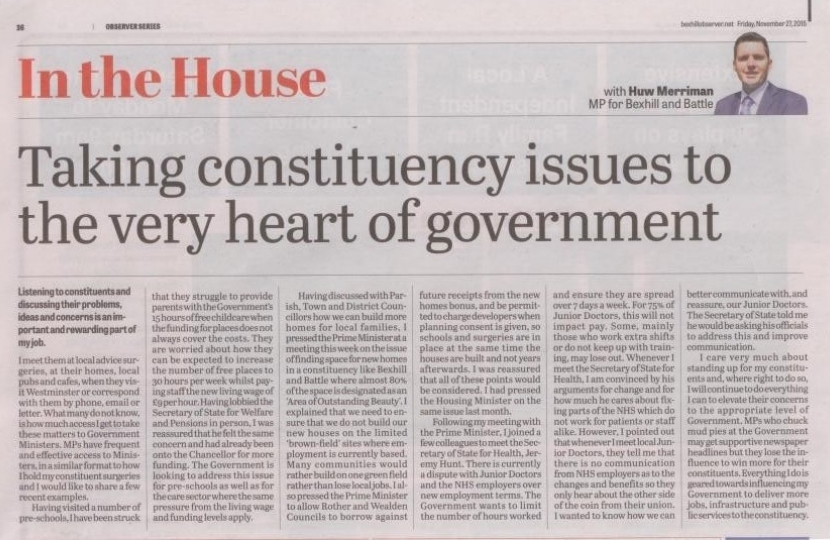
Listening to constituents and discussing their problems, ideas and concerns is an important and rewarding part of my job. I meet them at local advice surgeries, at their homes, local pubs and cafes, when they visit Westminster or correspond with them by phone, email or letter. What many do not know, is how much access I get to take these matters to Government Ministers. MPs have frequent and effective access to Ministers, in a similar format to how I hold my constituent surgeries and I would like to share a few recent examples.
Having visited a number of pre-schools, I have been struck that they struggle to provide parents with the Government's 15 hours of free childcare when the funding for places does not always cover the costs. They are worried about how they can be expected to increase the number of free places to 30 hours per week whilst paying staff the new living wage of £9 per hour. Having lobbied the Secretary of State for Welfare and Pensions in person, I was reassured that he felt the same concern and had already been onto the Chancellor for more funding. The Government is looking to address this issue for pre-schools as well as for the care sector where the same pressure from the living wage and funding levels apply.
Having discussed with Parish, Town and District Councillors how we can build more homes for local families, I pressed the Prime Minister at a meeting this week on the issue of finding space for new homes in a constituency like Bexhill and Battle where almost 80% of the space is designated as an 'Area of Outstanding Beauty'. I explained that we need to ensure that we do not build our new houses on the limited 'brown-field' sites where employment is currently based. Many communities would rather build on one green field rather than lose local jobs. I also pressed the Prime Minister to allow Rother and Wealden Councils to borrow against future receipts from the new homes bonus, and be permitted to charge developers when planning consent is given, so schools and surgeries are in place at the same time the houses are built and not years afterwards. I was reassured that all of these points would be considered. I had pressed the Housing Minister on the same issue last month.
Following my meeting with the Prime Minister, I joined a few colleagues to meet the Secretary of State for Health, Jeremy Hunt. There is currently a dispute with Junior Doctors and the NHS employers over new employment terms. The Government wants to limit the number of hours worked and ensure they are spread over 7 days a week. For 75% of Junior Doctors, this will not impact pay. Some, mainly those who work extra shifts or do not keep up with training, may lose out. Whenever I meet the Secretary of State for Health, I am convinced by his arguments for change and for how much he cares about fixing parts of the NHS which do not work for patients or staff alike. However, I pointed out that whenever I meet local Junior Doctors, they tell me that there is no communication from NHS employers as to the changes and benefits so they only hear about the other side of the coin from their union. I wanted to know how we can better communicate with, and reassure, our Junior Doctors. The Secretary of State told me he would be asking his officials to address this and improve communication.
I care very much about standing up for my constituents and, where right to do so, I will continue to do everything I can to elevate their concerns to the appropriate level of Government. MPs who chuck mud pies at the Government may get supportive newspaper headlines but they lose the influence to win more for their constituents. Everything I do is geared towards influencing my Government to deliver more jobs, infrastructure and public services to the constituency.


